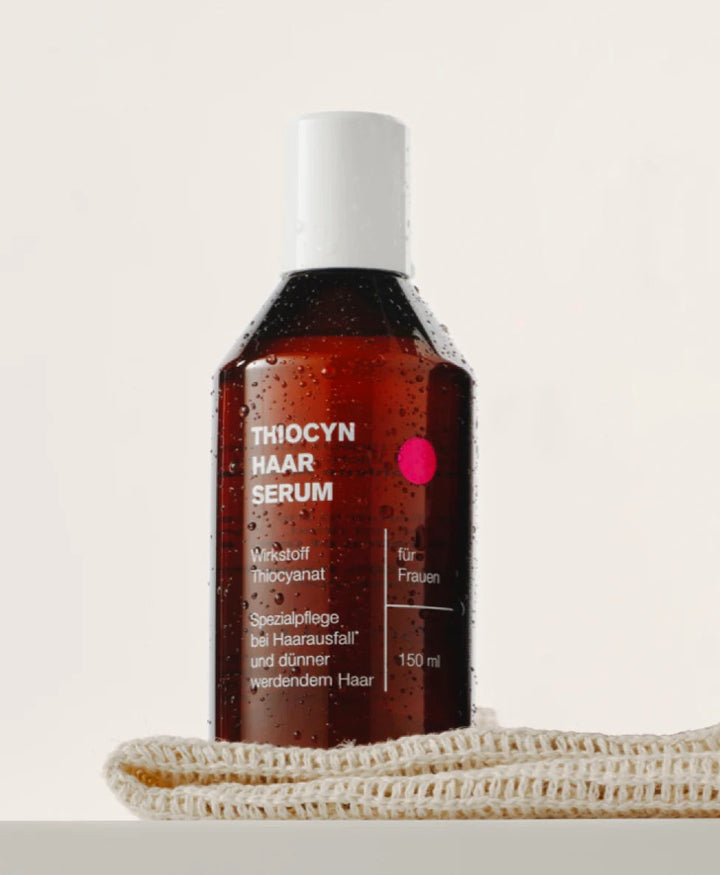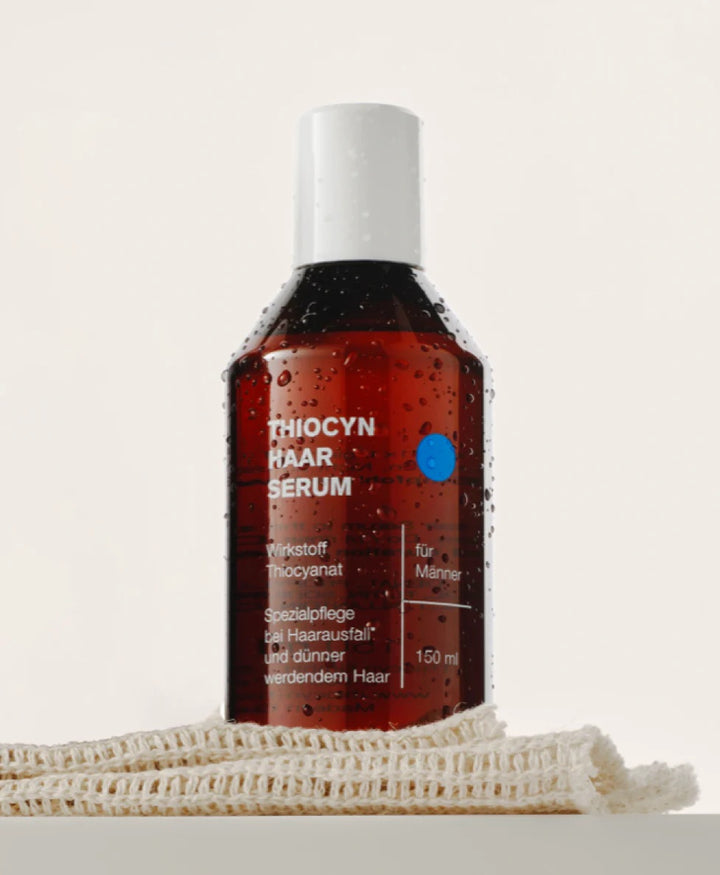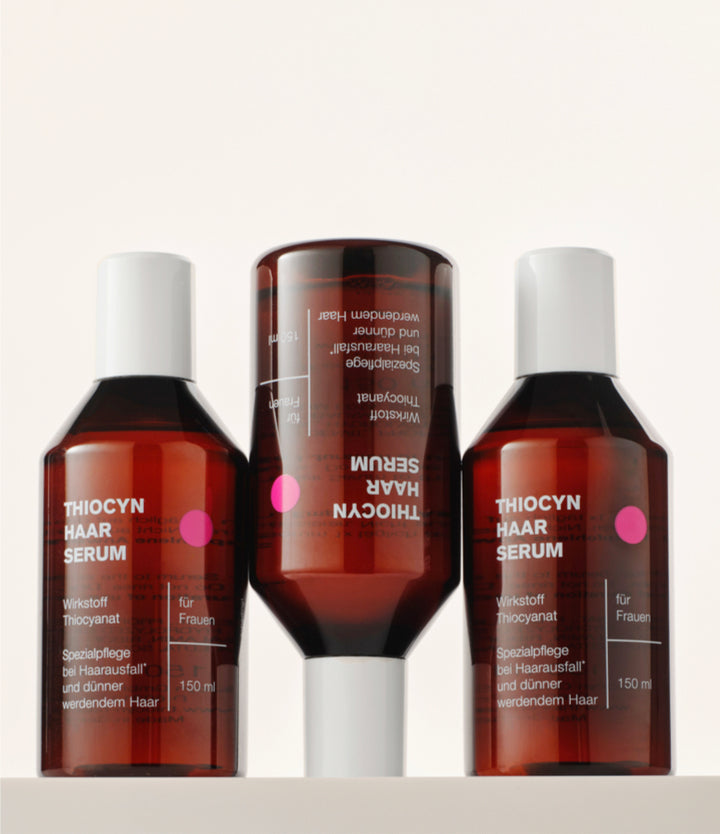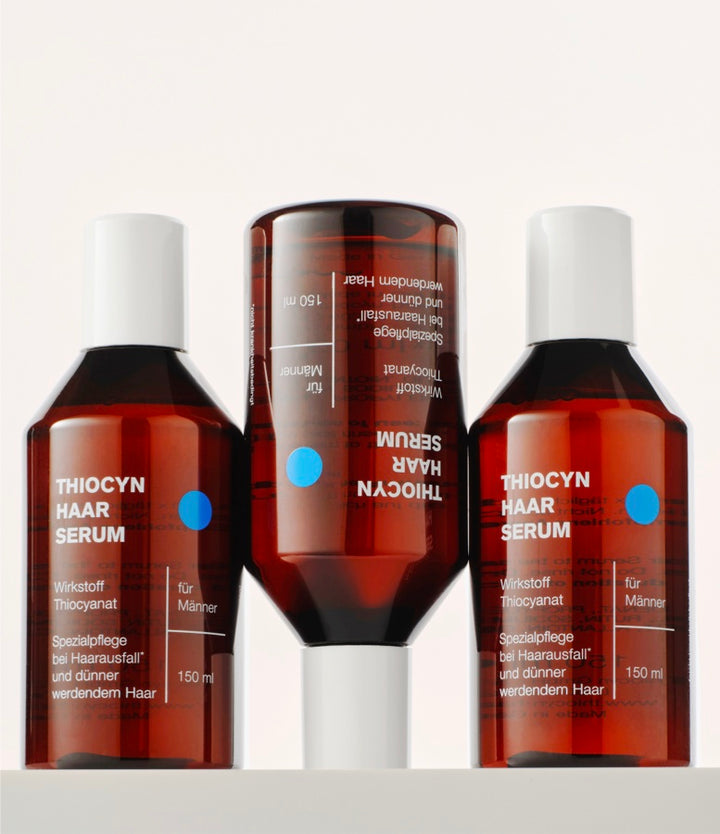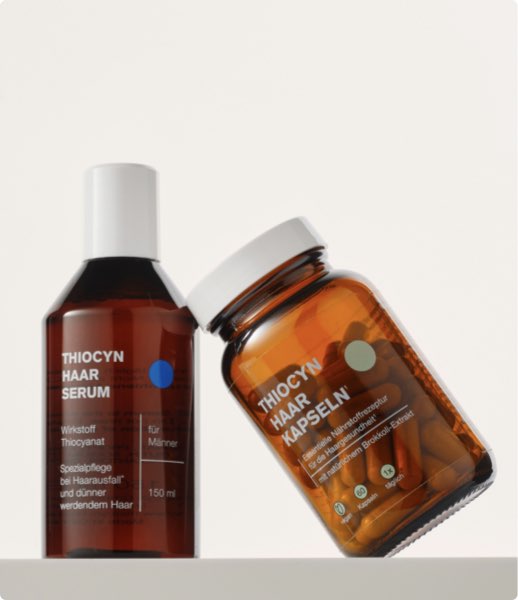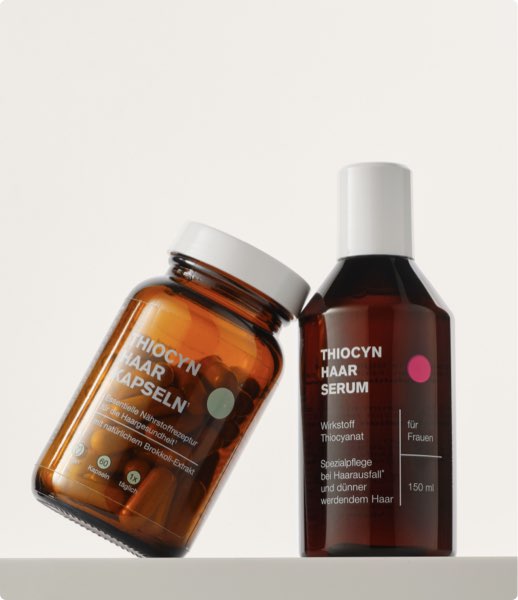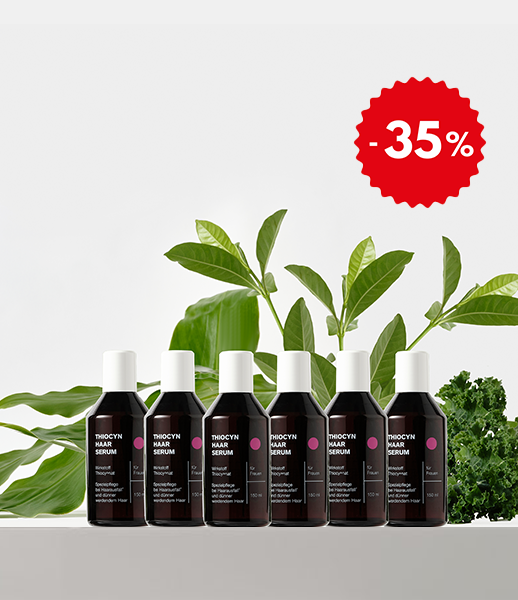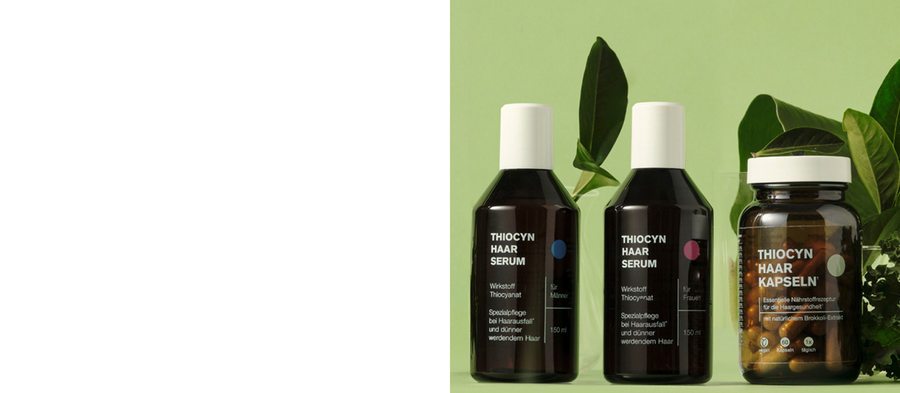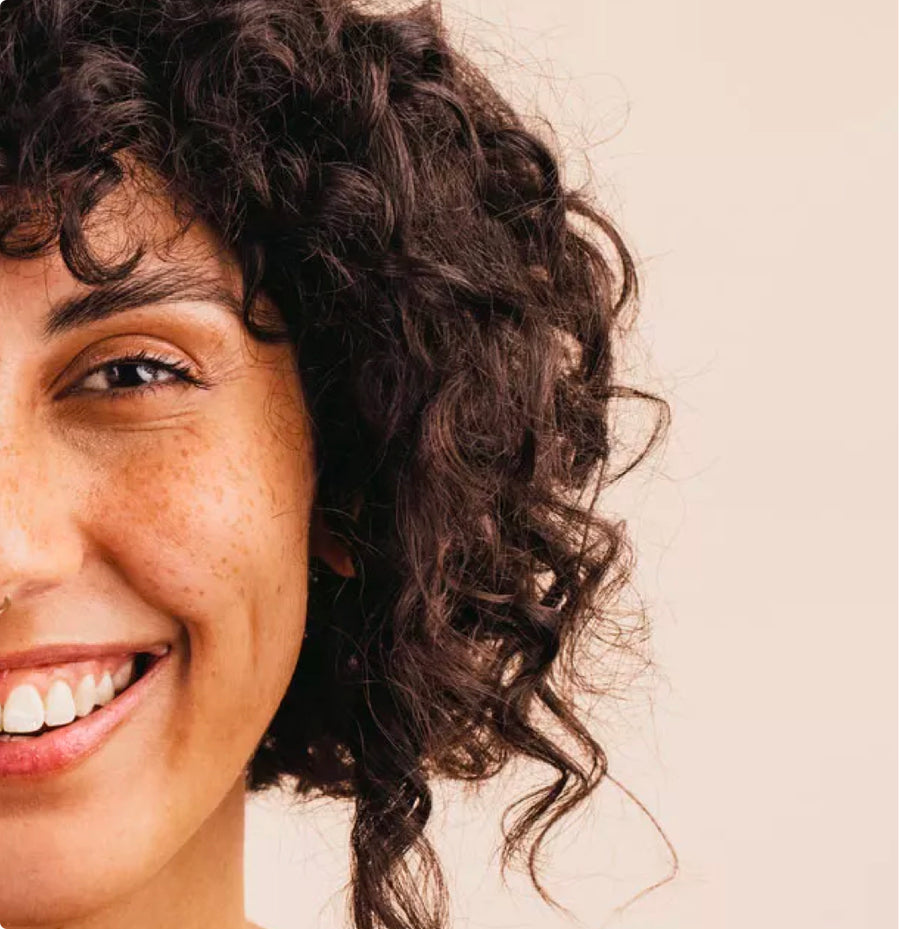| 04. July 2023
Hair loss menopause: why now?
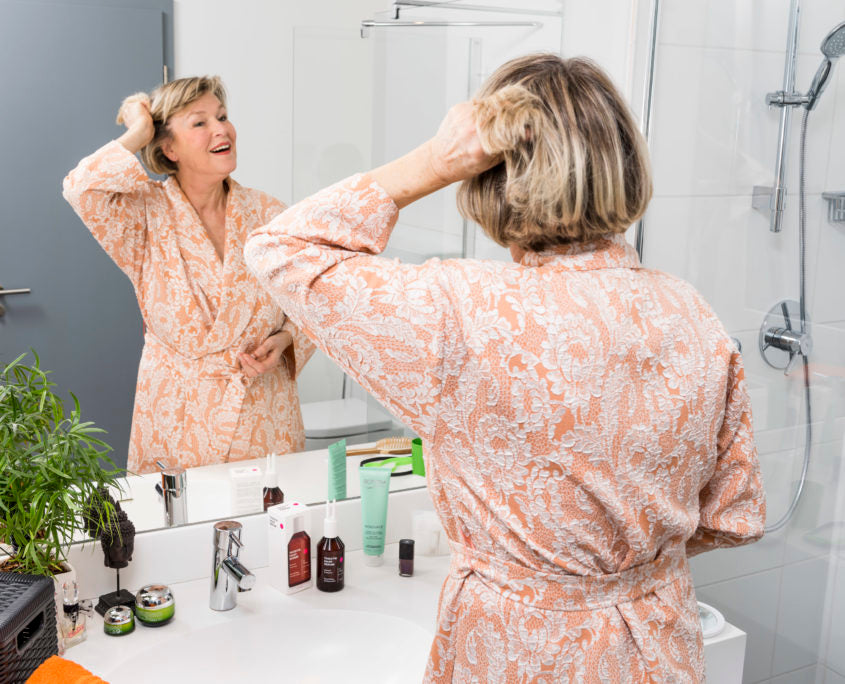
- A good quarter of women are affected by thinning hair during menopause
- With the onset of menopause, the female body produces less and less estrogen and eventually no estrogen at all.
- Less estrogen at the hair roots leads to diffuse hair loss in women, and the parallel preponderance of androgens leads to hereditary hair loss.
- The patented thiocyanate active formula in Thiocyn Hair Serum contributes to Stabilizes cell metabolism at the hair roots.
Estrogens are a natural hair growth agent in women, at least until the fifth decade of life. However, when menopause begins, the likelihood of diffuse hair loss also increases in women due to an estrogen deficiency. Hair lossA good quarter of women affected by hair loss also suffer from androgenetic alopecia, i.e. hereditary hair loss.
Hair loss during menopause: What happens to my body?
Essentially, the period surrounding menopause is a reversal of puberty. While the female body prepares to produce fertilizable eggs in early years, this capacity is systematically reduced from the mid-40s to mid-50s. When follicle maturation in the ovaries no longer occurs and ovulation sooner or later ceases altogether, estrogen, the "female" sex hormone, is no longer necessary for the further development of the egg cell.
What evolution apparently did not “take into account” is that the female organism also lacks estrogen for other bodily functions!
Various menopausal symptoms – including hair loss
Menopausal symptoms such as hot flashes, sweating, or sleep disturbances are the result. The psychological stress that comes with sudden, unexpected hair loss should not be underestimated. While men of the same age seem to cope without symptoms and don't exactly attract attention with their thinning hair, women with hair loss and decreasing hair density are certainly eye-catchers. Their own desire to look good, or the stress of not meeting this expectation, severely undermines their self-confidence. Hair loss during menopause is not a disease, but a symptom of a hormonal imbalance.
What are the causes of my hair loss? We'll tell you more.
Another reason for hair loss: menopause and hormonal imbalance
During menopause, a sudden estrogen deficiency becomes noticeable in the female body. Estrogen synthesis, such as estradiol from testosterone, gradually decreases. At the same time, there is a relative predominance of androgens, a derivative of the "male" sex hormone testosterone. at the hair roots. Dihydrotestosterone (DHT) has a dual effect: While hair growth increases on the face and body, hair on the head falls out. Doctors often recommend hormone therapy with estrogens in these cases.
Time for hormone therapy with estrogens?
"It depends!", say even gynecologists who compensate for their patients' estrogen deficiency during menopause with hormones to alleviate menopausal symptoms. However, hormone treatment is by no means a necessity. It is based on the needs of the woman, and the benefits of a Hormone therapy against possible side effects. Hair loss is by far not the most important indication for starting hormone therapy.
Hope for hair loss* during menopause: Thiocyanate
For all women in menopause who do not need hormones or who consciously decide against hormone treatment, the natural molecule thiocyanate is a very attractive option for counteracting hair loss at the onset of menopause. The patented Thiocyanate active formula Thiocyn Hair Serum does not interfere with any hormonally controlled metabolic processes. Therefore, side effects and interactions are not known. Thiocyanate strengthens the hair roots and protects them from growth-disrupting influences. A stable cell metabolism and a normalized hair cycle are important prerequisites for healthy hair growth. Hair growth.
Our tip: Women who choose hormone therapy can of course also try thiocyanate if they are not satisfied with their hair quality!
Questions for our service team
How long does menopause last?
That's impossible to say in general. The fixed point is definitely menopause, the last menstrual period in a woman's life. The years before and after menopause are referred to as perimenopause. On average, women are affected by menopausal symptoms for about seven years, according to the US-based SWAN study.
Does hair loss disappear when menopause ends?
Hereditary hair loss in women won't be alleviated by hormonal imbalances. As a result of estrogen deficiency, the hair at the crown becomes smaller. However, as long as the hair continues to grow back, it's possible to strengthen the hair roots and stimulate their cellular metabolism.
What are the benefits of changing your diet during menopause?
To alleviate menopausal symptoms, the German Menopause Society recommends a "health-promoting" diet for women around 50. Health-promoting specifically means reducing energy intake. Less belly fat reduces cardiovascular disease and type 2 diabetes. What should I eat? Vegetables and fruit as desired, and if possible, avoid empty carbohydrates like white flour and sugary drinks.
What are the benefits of hormone treatment during menopause?
Hormones can reduce hot flashes or mood swings and prevent possible fractures in osteoporosis.
What speaks against hormones?
Hormones interfere with all metabolic processes in the body and can potentially lead to undesirable side effects and interactions. No current study can prove that hormones can prevent hormonally-induced hair loss or improve hair growth.
Is it possible that the condition of the scalp also changes during menopause?
Absolutely. Because the estrogen deficiency reduces the scalp's ability to retain water. The skin's protective barrier becomes more permeable to irritants and allergens. The result is a flaky scalp and itchy skin.
When are the first results with Thiocyn hair serum visible?
The hair serum penetrates the scalp directly into the hair follicles and roots. The effect of the patented thiocyanate formula can therefore initially be seen in the condition of the scalp, as redness disappears and dandruff diminishes. Just as intact, nutrient-rich soil provides the basis for healthy plant growth, a healthy scalp is essential for hair growth.
Read by 23,000 people
Do it like 23,000 others and find out how you can improve your hair health - with great offers and discounts as well as helpful advice
